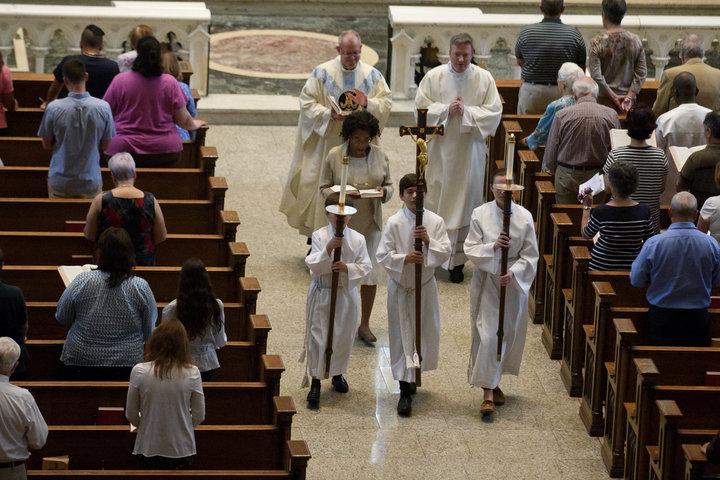|
The Catholic Church Ignores This Child Sexual Abuse Law
By Angelina Chapin
The church has a history of handling child abuse allegations internally ― which protects priests and endangers children. One of the most damning findings from the recent grand jury investigation into widespread child sex abuse in Pennsylvania Catholic Church dioceses is how leaders covered up the misconduct. “It’s like a playbook for concealing the truth,” wrote the grand jury in its report, outlining seven tactics that church officials followed, such as using euphemisms for rape, shuffling predatory priests among dioceses and conducting bogus internal investigations. While advocates said the Pennsylvania report is the largest and most comprehensive of its kind for any one state, bombshell reports of child sex abuse in the Catholic Church are hardly new. From the time The Boston Globe published a 2002 exposé on clergy sexual abuse, there have been many high-profile incidents, including an Australian cardinal charged with child sex offenses in 2017 and more recently, an investigation into rampant sex abuse in Chile’s Catholic Church. Experts told HuffPost that sexual abuse continues in large part because the church ignores laws enacted to protect kids from harm. In particular, they said clergy regularly violate mandatory reporting laws, which require certain groups to inform child protective services or the police about suspected child abuse. But changing the church’s deeply rooted culture of silence and trust into one that holds itself accountable to law enforcement is a big task. Sherryll Kraizer, the founder and director of the Coalition for Children, said the Catholic Church protects “pedophile priests” instead of children. “It’s a culture that they are struggling with giving up,” she said. “The law is clear, and the criminality is clear, and the sin is clear.” The church did what it wanted because it could get away with it. Angela Liddle, president and CEO, Pennsylvania Family Support Alliance In most states, groups that work with children — such as teachers, social workers and pediatricians — are mandatory reporters, and in 28 states, clergy are also in this category. Enforcing the child abuse law helps keep kids safe. “You need to have very rigid rules about reporting child sexual abuse to the authorities,” said Marci Hamilton, the CEO of the advocacy group Child USA. “It shouldn’t matter where they learn about it, whether it’s in a confessional or it’s on the street or in a classroom.” And though some experts have worried that tougher mandatory reporting laws could lead to false reports that unnecessarily traumatize children, any organization working with kids should be required to go through extensive training on child abuse that explains how and when to make a report, said Angela Liddle, the president and CEO of the Pennsylvania Family Support Alliance. She said that teachers in Pennsylvania, for example, are legally required to do this training every five years. Instead of reporting child abuse to outside authorities, the church has a history of handling allegations internally ― which protects priests and endangers children. Liddle said that if church members report child abuse at all, they usually tell a senior member of the clergy instead of police, which could keep children in danger. “You have a supervisor who may dissuade you from making a report,” she said. “You have an imbalance of power right from the start that is not best practice.” The Pennsylvania grand jury report describes how the church encouraged its members to handle complaints “in house,” as they would a “personnel matter.” It describes how the institution assigns “fellow clergy members to ask inadequate questions and then make credibility determinations about the colleagues with whom they live and work” and moves them to other parishes, where they still have access to children. While the experts interviewed by HuffPost said there’s no question that children would be safer if the church followed mandatory reporting laws, the institution would first have to change its confidential culture. “They have operated like a secret sect apart from the rest of the world,” said Liddle. “They can’t do that anymore.” She said the Catholic Church is so good at fostering trust among its followers that members have not questioned whether priests should have the authority to handle child abuse claims. “The church did what it wanted because it could get away with it,” she said. “We have been socialized to look at people in the clergy almost as if they are gods ... That’s how these children were groomed.” While certain policy changes — such as required child abuse training and a prohibition on clergy being alone with a minor — could keep kids safer in the church, Hamilton said she believes the culture will change only if clergy are punished for failing to follow mandatory reporting laws. “I think the ultimate accountability is criminal accountability,” said Hamilton. “If bishops were charged with endangerment of children, I think you would see changes quickly.” She pointed out that schools are safer environments because mandatory reporting is “alive and well” and that teachers are often charged for not following the policy. “[Clergy] should be held accountable under civil and criminal laws. They should have no special exemptions,” Hamilton said. “Any religious [institution] that is permitted to let child sex abuse circulate within the organization poisons its own organization.”
|
.
Any original material on these pages is copyright © BishopAccountability.org 2004. Reproduce freely with attribution.
